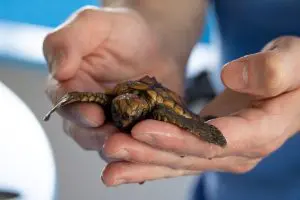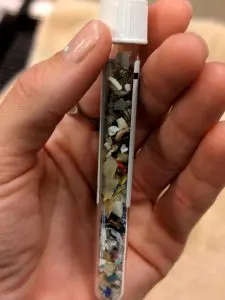

These post hatchling sea turtles are brought to us by the Sea Turtle Preservation Society.
Even the smallest change in your daily routine can save the future of baby sea turtles and the oceans they call home.
The past few weeks at our Sea Turtle Healing Center had been bustling as our team took in about 90 post-hatchlings, otherwise known as baby sea turtles who have washed ashore, usually because of rough ocean conditions.
Each time we welcome more post–hatchlings through our doors, our veterinary team assesses their condition and any alarming signs to keep an eye on.
While checking on the post–hatchlings, our team noticed tiny pieces of material in the fecal matter of multiple turtles. After washing down the fecal matter, they discovered miniscule pieces of microplastic.
Unfortunately, this discovery doesn’t come as a surprise.

Our Healing Center team stores these plastic pieces in a test tube.
According to the National Oceanic and Atmospheric Administration, sea turtles can often mistake plastic debris in the ocean for their prey.
Additionally, both large and small pieces of plastic can begin to smell like items sea turtles would eat the longer these pieces remain in the ocean, further misleading the turtles. When this debris becomes lodged in their digestive system, turtles can lose their will to eat or ability to pass fecal matter, threatening their lives.
Our team monitored these post-hatchlings, carefully watching for any turtles who may stop eating, said Sea Turtle Healing Center Program Manager Shanon Gann.
Recently, these little sea turtles were brought by boat back to the ocean by Sea Turtle Care & Conservation Specialists, who went about 20 miles offshore in south Florida to find sargassum for the young turtles. Thank you to Sea Turtle Preservation Society for transporting the turtles south for this boat ride!

If a post hatchling refuses food, they are separated from the group to further monitor them.
The harsh reality is that cases like these will continue to arise unless we collectively act against the pollution of our waters, one measure at a time.
Shanon urges us to refuse single-use plastics like bottles and utensils, clean up after ourselves at the beach and pick up plastic we see along the shoreline.
“Most people choose to live near the ocean or waterways because they are beautiful,” she said. “Become better stewards of the beautiful place you live, so that future generations will have the opportunity to experience the same beauty.”
Have you found a sea turtle that needs help? Visit this page or call the Sea Turtle Preservation Society at 321-206-0646. Want to help the Sea Turtle Healing Center? Support our Zoo, or view our Healing Center’s wishlist.
